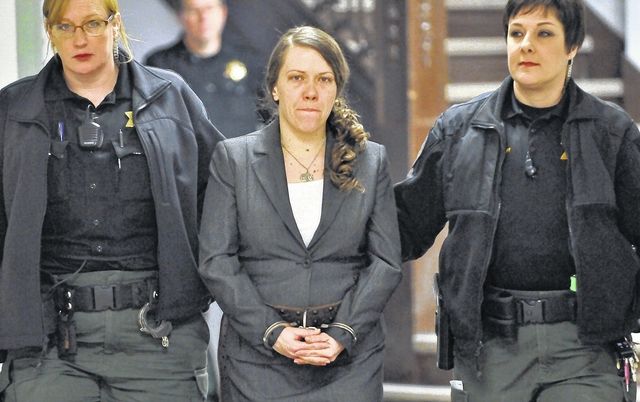Click here to subscribe today or Login.
WILKES-BARRE — Jessica Alinsky’s trial will go on.
A mistrial in the homicide proceeding was avoided in a crowded Luzerne County courtroom Wednesday, despite testimony from an Australian bloodstain pattern expert that claimed one of the Commonwealth’s key witnesses presented a “flawed” report on Alinsky’s homicide case during a training seminar.
Judge Tina Polachek Gartley shot down the motion after less than 20 minutes of deliberation.
Prosecutors allege Alinsky, 32, fatally shot Matthew Gailie on Sept. 2, 2011. Gailie, a 34-year-old corrections officer at State Correctional Institution Frackville, was found with a gunshot wound to the face on the living room floor of the Hazle Township home the couple shared.
Alinsky then waited to call 911, planted a gun in Gailie’s hand and a bank statement next to his body in an attempt to make the death look like a suicide, prosecutors allege. The Shenandoah woman then changed her story several times when confronted with conflicting details, prosecutors said.
The trial took a dramatic turn Tuesday, when defense attorney Demetrius Fannick called for a mistrial on allegations an Australian doctor had contacted him out of the blue with details about the case.
Mark Reynolds, who testified on the matter via telephone from an Australian airport, said he instructed the 80-hour forensics course in Bethlehem from March 24-28, 2014.
There, Reynolds voiced to state police Trooper John Corrigan concerns over the investigator’s findings in his Nov. 25, 2013 report on the Alinsky case, specifically conclusions that were “flawed and not supported by scientific principles.”
Reynolds testified that despite his concerns, Corrigan passed each aspect of the course and was awarded a certification.
Corrigan was admitted a week ago as an expert witness and testified the crime scene was unlike any he’d seen in 17 years as a police officer, ultimately concluding Alinsky “deliberately manipulated physical evidence in an attempt to make it appear that a financially related suicide had taken place.”
In an email exchange submitted as part of the defense’s motion for a mistrial, Reynolds said he disagreed with “almost everything Corrigan had to say” regarding his investigative conclusions and found the trooper to “possess a level of arrogance above many that I have met.”
After confronting Corrigan with what Reynolds believed were the flaws in his report, Corrigan allegedly rebuffed his advice, Reynolds said in the email.
“I still think she did it,” Corrigan allegedly said.
Corrigan, called to the witness stand Wednesday to defend his report, said he attended the course so he could be versed in different types of training. Nothing was shared about the report by Reynolds that he didn’t already know, Corrigan said.
“We take into account all possibilities and rule them out one-by-one and go with the most plausible scenario,” Corrigan said. “Dr. Reynolds didn’t bring up anything we didn’t think of ourselves.”
By not sharing the information, Fannick argued the Commonwealth violated the Brady rule, which requires prosecutors to disclose information that could absolve the alleged guilt of a defendant.
A response to Fannick’s motion for mistrial filed by prosecutors was unavailable Wednesday afternoon, but Assistant District Attorney Daniel Zola during the hearing stated Fannick failed to prove a stipulation of the Brady rule that requires proof that the omission is favorable to the defendant.
Additionally, the evidence shows Alinsky herself provided admissions and confessions in line with what Corrigan testified to.
“Their request for a mistrial simply must fail,” Zola said.
Fannick argued that had he known about training seminar sooner, he would have been able to retain and question Reynolds, who had a difference of opinion on a crime report entered into evidence and relied upon by other Commonwealth witnesses, including forensic pathologist Gary Ross and psychiatrist Richard Fischbein.
“The reason I have no idea is because they withheld it,” he said.
Moreover, the former Australian cop’s expertise far outweighed that of Corrigan, who had never instructed courses on par with the likes of Reynolds, Fannick argued.
“His only instruction has been at Camp Cadet,” Fannick said. “To 12-year-olds.”
During cross-examination, Zola questioned why Reynolds reached out to Fannick and not the district attorney’s office or the state police, the agencies that prosecuted and investigated the case.
Fannick’s contact information was the first he had found after reading about the case in a forensics magazine, Reynolds said. He was later asked by Zola whether he knew Alinsky had made several admissions to police included in Corrigan’s report.
Reynolds stated he didn’t consider confessional statements in his findings.
“I don’t care what other people say.” Reynolds said. “I support my findings with science.”
The trial is scheduled to resume Thursday at 9 a.m. when the defense will present its first witness.





